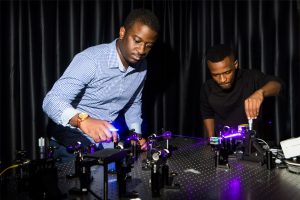TechInAfrica – When Isaac Nape, a Ph.D. student of Wits from Gauteng crossed the opportunity to get involved in hybrid research of quantum physics and data security, he didn’t think twice about the offer.
The broad scope of quantum physics only further ignites Nape’s passion for the field. Under Professor Forbes’s supervision, Nape completed his Physics’ Master’s degree and aims for a Ph.D. while continuing his research about quantum physics and its implementation for the future of technology, and mainly its application to real-world challenges.
For Nape, it’s thanks to the broad concept and frameworks of quantum physics that finding practical application in real life makes the whole process not only challenging but also rewarding for him.
Nape actively conducts his research on Structured Light Lab, experimenting with optics. As optics is closely related to fibre in ways that make them almost aligned together, Nape happily engages in the world of fibre, so when his team, which consists of himself, his supervisor, and colleagues from China, found an interesting revelation in their study of quantum physics capability to improve the security of transmitted data through the series of fibre networks, he couldn’t be more delighted.

Isaac Nape (right)
“The idea of using quantum physics to develop cutting-edge technology, relevant to ICT, was mesmerizing,” Nape says.
The team developed a trick under their sleeves to distribute multiple patterns of light instead of the usual single pattern limited in the traditional optical fibre structure.
“We achieved this ‘quantum trick’ by engineering the entanglement of two photons. We sent the polarised photon down the fibre line and accessed many other patterns with the other photon,” he explains.
This is done without altering the base structure of the fibre network.
“Since the polarisation entangled photon has only one pattern, it could be sent down the long-distance single-mode fibre, while the twisted light photon could be measured without the fibre, accessing multi-dimensional twisted patterns in the free-space,” Nape says.
He also wants to see this quantum technology developed in the country, creating a global-scale competitive environment.
“I hope to be one of the few to compete internationally with private companies by using this technology in the future. So I hope I find myself in a company or research institute that will allow me to develop quantum-based tech, he says.

Nape also encourages the youngsters for the path ahead that they’re about to enter. Exploring knowledge is one way to go, but connecting with the right supervisor is an equally important factor to navigate the hurdles of research in the sci-tech field.
“Developing new technology requires creativity and the right set of skills. That can only be achieved by learning from the right people and applying yourself effectively,” Nape says.
The next step after figuring out the whole process is to ‘work, create, and invent’, according to Nape.
Source: mybroadband.co.za
 We just launched our WhatsApp channel. Want to get the latest news from the Tech in Africa?
We just launched our WhatsApp channel. Want to get the latest news from the Tech in Africa?

